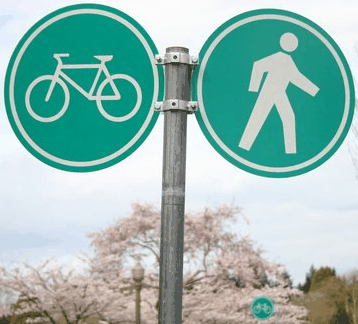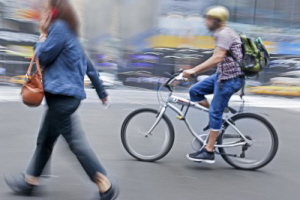By Liz Sheehan Castro, Worcester Food & Active Living Policy Council and Jerry Powers, WalkBike Worcester
**This article appeared in the Telegram and Gazzette on March 12th, 2-13 as an “As I See It” editorial.**
Many of us know transportation is about access to jobs and housing, about economic competitiveness, convenience, quality of life, and our environment. Yet our transportation system – roadways, bridges, buses, trains, regional transit systems, sidewalks, and bike lanes across the Commonwealth – also has a profound impact on our health that we may rarely think of. Walking to the bus or train, walking to work or the store, or hopping on a bike to get to school can really support our overall health.
For people who live close to shops, schools, churches and business, walking is a great option and an economic boon – but only if the route is well maintained, safe for pedestrians, and enjoyable. Research shows that nearly half of us will walk up to a mile to get to church or school and 35% of us will walk up to a mile to work. Biking has seen a steady increase across the Commonwealth and here in Worcester – but we see it most in places that have bike lanes or other accommodations for cyclists.
Increased walking and biking can decrease the risk of obesity, high blood pressure, type 2 diabetes and heart disease. These conditions are costly to individuals and society at large. Reducing rates of these preventable chronic diseases offers Massachusetts residents, businesses, and government the possibility of billions in savings in health care costs.
Making improvements to our state-wide transportation system supports safety, economic development, a healthy environment and can really make our communities more alive and vibrant. Research shows that people who live near shops and restaurants tend to shop and eat out more often. Greater neighborhood walkability is also related to increased home property values. Investment in bicycling infrastructure has been shown to create jobs. More travel by public transit, foot, or bike means better air quality, which translates to better health outcomes for people with respiratory conditions like asthma. It means fewer injuries and deaths from traffic crashes and increased safety for all road users, including motorists.

But let’s be honest. Most people don’t use public transit, lace up their sneakers, or pump up those bike tires because they are concerned about health care costs or economic development. They do it because it works for their schedule, their lifestyle, and their wallet. And for people who rely on walking or biking because they have no other choice, investing in transportation is key to their safety and wellbeing. A system that provides accessible and affordable transportation options enables residents of Worcester and Central Massachusetts to get to work on time and provide for their families, get their children to medical appointments, and make it to the grocery store to buy healthy food for dinner.

Investments we’re making already help people walk and bike around Worcester more safely. Federally funded improvements in the Canal District have resulted in better lighting, better sidewalks, and marked bikelanes. Additional improvements to the Burns Bridge, Front and Franklin Streets and neighborhood streets around the city, will make multi-modal travel easier and more enjoyable.

But, on the whole, this balance is in danger of being upset, as our infrastructure deteriorates with each passing year and regional transit systems remain underfunded. Too many streets and sidewalks are in a poor state of repair, or sidewalks don’t exist. Bike accommodations are increasing but still too rare. Buses run less frequently than ideal and run less often on evenings and weekends.
With increased support for public transit, walking or biking, we can really support the health of our entire community in every sense. Every time we opt for the car as the best way to get to work or to the store, we lose minutes of physical activity, increase harmful emissions, and increase the risks from traffic crashes. For residents without access to a car, it might mean missing that medical appointment or shopping at a corner store rather than making the trip to the full-service grocery store.
If we want to make public transit, walking, and biking attractive to all, we must invest in a 21st century transportation system today. For the health of the Commonwealth, Central Massachusetts and Worcester, the time for action is now.



